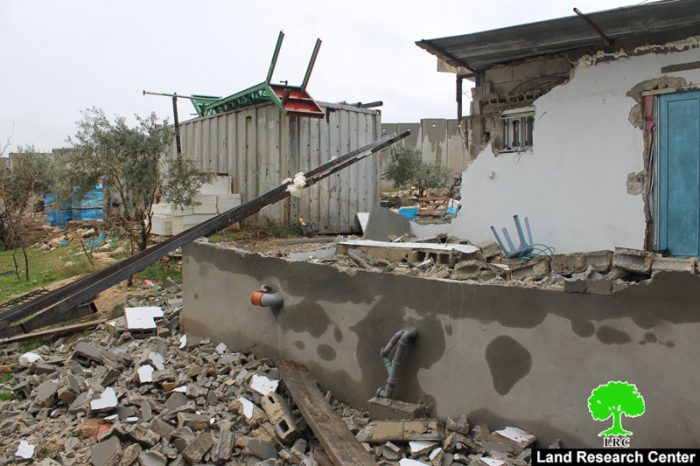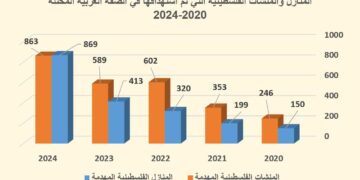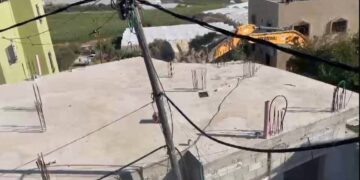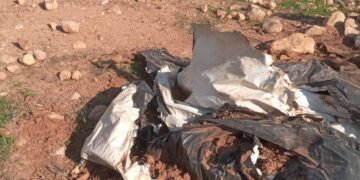On February 15, 2017, dozers of Israeli Occupation Forces demolished part of the residence of citizen Abdallah Al-Khatib in Hizma village, north Jerusalem on the claim of "unlicensed construction". The room– built by concrete blocks and roofed with metal slaps– is of 30m2 in area and home for four member family.
Citizen Al-Khatib told Land Research Center the following:
" The room was annexed to the residence on December 2016 to have more space since I live in my family house that is 70m2 in area"
He also added: " On February 14, 2017, employees from the occupation's municipality arrived at our neighborhood and hanged a demolition order on room . We feared that the occupation demolishes the house and fine us 50,000 INS. Therefore, I demolished part of it but the occupation arrived next day and continued the demolition operation. Clashes erupted and policemen assaulted us and fired gas and stun grenades at us and people of the neighborhood. The demolition operation lasted for an hour before the force and dozers withdrew. Now, I live with my family again."
About Hizma:
It is 8km to the northeast of Jerusalem; it populates 9256 people on a built-up area of 1000 dunums out of its 18000 dunums total land area. According to Oslo lands classification of 1993, a small part of the village's area — the built-up area– is classified as area "B" that is under Palestinian control where the rest is classified "C" that is administratively run by the occupation municipality of Jerusalem . The occupation confiscated 2500 dunums of Hizma for the expansion of various colonies namely ( Pisgat Zev, Pisgat Amir, Adam and Nevi Yaacov)
It should be marked that the apartheid wall travels 4km on the lands of Hizma town, isolating 40% of the village's total area behind its construction.
Noteworthy, closures on the town have been applied on the town ever since the first intifada of 2000. Such measure was meant as a collective punishment on the town's residents.
Land Research Center LRC sees that demolitions contradict with all the International conventions and Humanitarian laws including:
Article 17 of the (1948) Universal Declaration of Human Rights stating: “Everyone has the right to own property alone as well as in association with others. No one shall be arbitrarily deprived of his property.”
Section ‹G› of article 23 of the (1907) The Hague Conventions asserting: “In addition to the prohibitions provided by special Conventions, it is especially forbidden to destroy or seize the enemy's property, unless such destruction or seizure be imperatively demanded by the necessities of war.”
Article 53 of the Geneva Fourth Convention (1948) declaring: “Any destruction by the Occupying Power of real or personal property belonging individually or collectively to private persons, or to the State, or to other public authorities, or to social or cooperative organizations, is prohibited, except where such destruction is rendered absolutely necessary by military operations.”
Section 1, Article 11 of the International Covenant on Economic, Social and Cultural Rights (1966): “The States Parties to the present Covenant recognize the right of everyone to an adequate standard of living for himself and his family, including adequate food, clothing and housing, and to the continuous improvement of living conditions.
Prepared by
The Land Research Center
LRC

















